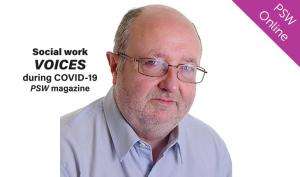Coronavirus and inequality - like after WW2, a fairer society must be the legacy

I’ve never been a big fan of Freud’s work. He was part biological reductionist and part phenomenologist. His biological determinism was dangerously simplistic, and his phenomenological insights were much better expressed and more fully developed by other phenomenologists, especially the existentialists.
But that does not mean none of his ideas has any value. One I have found useful is that the structure of a crystal is shown where it is broken. In other words, looking at where systems go awry will tell us much about how they normally work.
The coronavirus health crisis has been a good, if sad, example of this. The lockdown restrictions, necessary though they may be, have highlighted the significance of structured inequalities in our society. Compare a wealthy family restricted to their home, where they have several acres of land to make use of, at one extreme, with a single mother in a two-bedroomed high-rise flat with two young children to keep amused at the other.
Compare those in affluent areas who have a well-maintained park to do their daily exercise in with the sink estate resident who has only a broken glass and drug dealer strewn concrete jungle. Compare the trader who can still get rich by buying and selling stocks and shares online with the furloughed manual worker who was barely struggling to make ends meet on 100 per cent wages, let alone on 80 per cent, or the low-paid retail workers who are expected to keep working as normal, even if it means putting their health – and even their lives – at risk.
Compare the younger people who can stay connected with all their technical gadgets and online memberships with many older people who do not own a computer and may not know how to use it even if they had one.
Consider the people living with an abusive partner, now with them 24/7, with no time away for respite. Consider too, those households where no abuse was previously taking place, but where the tensions and pressures of the lockdown restrictions are now leading to abusive behaviours, physical and emotional.
Compare those with a high level of ‘social capital’ (or social connections), with those who had limited capital to begin with and who have then found themselves with more or less none. Similarly, consider those with significant mental health challenges who rely on their limited support systems to stay afloat, systems that have been significantly curtailed or disappeared altogether.
One of the longstanding core elements of the social work theory base is crisis intervention. It teaches us that, when a crisis occurs (that is, when a turning point is reached), our role is not just to help people ‘get through’ the crisis, but to actually benefit from it, to take the opportunity to learn, grow and be empowered by the experience. So, if we relate that to the coronavirus health crisis, what can we learn and how can we benefit?
The ‘broken crystal’ of our society is telling us a great deal about how our society is not working how it could or should. It is clearly revealing the structural inequalities and the cultural assumptions that maintain them. Of course, these problems are not news to us in social work, but the key point is that the crisis gives us the opportunity to make the general public more aware of how an unequal and deeply divided society feeds power to the already powerful, while disempowering the rest of us, particularly those of us deemed to be ‘vulnerable’ for whatever reason.
The crisis has shown us that communities can pull together and support their members. It has also shown us that governments can invest in public services when push comes to shove, and it has also shown us who are the vitally important contributors to our society and economy, who are the ones who cream off the profits for their lives of luxury – luxury that is often bought at the expense of our public services and the social fabric they serve and represent.
I’ve never believed in magic answers and I’m not proposing any now. However, the point I do want to make is that the crisis has shown us that things don’t have to be the way they have been in recent years. But, as crisis theory tells us, this situation presents us with opportunities for positive change, despite the negative consequences of the crisis itself.
To capitalise on the opportunities, the movement needs to be broader than social work. We can’t do it on our own. The 1980s idea that social work could be the primary driving force for radical social change was naïve then and is now, but I have always believed that social work can play a part in that. We have much to contribute in solidarity with others and the recent circumstances present us with a much greater opportunity to highlight the possibilities of a much more humane and humanitarian society.
The Dunkirk spirit did not last long after the Second World War, and so we need to strike while the iron is hot before the old habits, the old assumptions (and the old inequalities) reassert themselves and take us back to square one.
Dr Neil Thompson is an independent writer, educator and adviser. His latest books are Promoting Resilience (co-edited with Gerry Cox) and the new fifth edition of Understanding Social Work. His website and Learning Zone are at www.NeilThompson.info.
Do you have experiences, thoughts or feelings of social work during the COVID-19 pandemic you would like to share with Professional Social Work magazine? Click here to find out how
